MERCEDES-BENZ GL 2016 Owners Manual
Manufacturer: MERCEDES-BENZ, Model Year: 2016, Model line: GL, Model: MERCEDES-BENZ GL 2016Pages: 462, PDF Size: 12.66 MB
Page 341 of 462
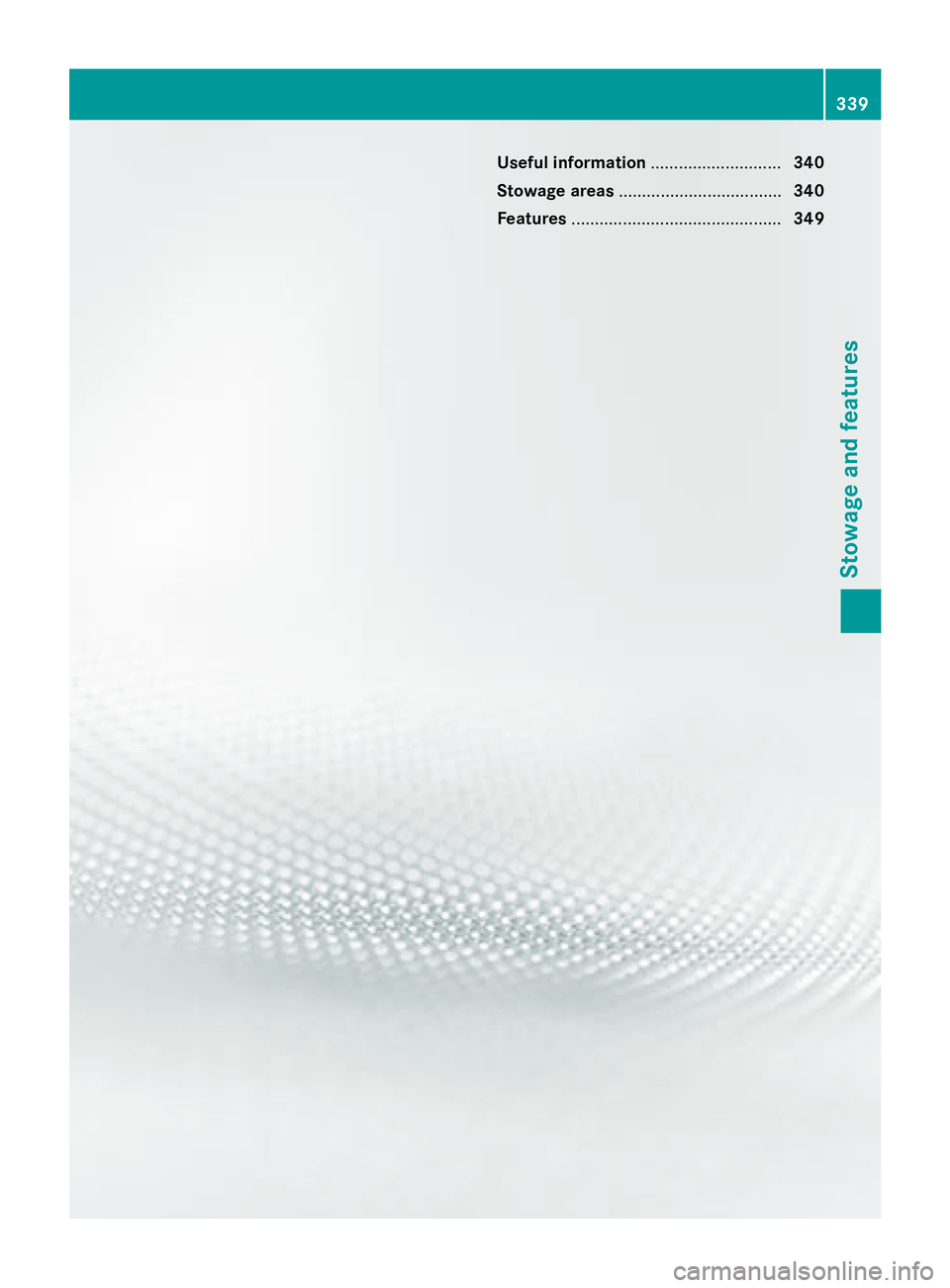
Useful information ............................ 340
Stowage areas ................................... 340
Features ............................................. 349 339
Stowage and features
Page 342 of 462
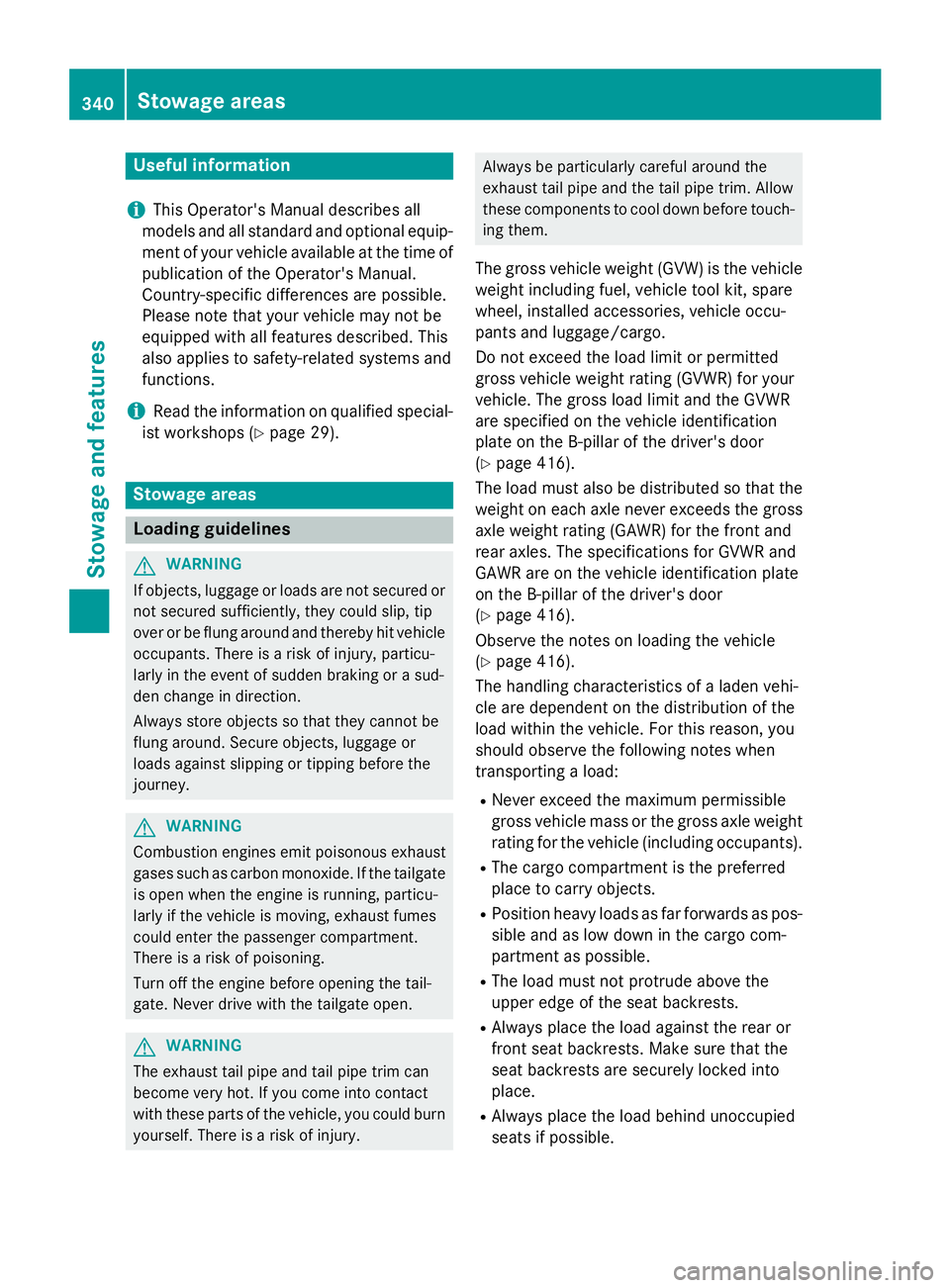
Useful information
i This Operator's Manual describes all
models and all standard and optional equip-
ment of your vehicle available at the time of
publication of the Operator's Manual.
Country-specific differences are possible.
Please note that your vehicle may not be
equipped with all features described. This
also applies to safety-related systems and
functions.
i Read the information on qualified special-
ist workshops ( Y
page 29).
Stowage areas
Loading guidelines
G WARNING
If objects, luggage or loads are not secured or
not secured sufficiently, they could slip, tip
over or be flung around and thereby hit vehicle
occupants. There is a risk of injury, particu-
larly in the event of sudden braking or a sud-
den change in direction.
Always store objects so that they cannot be
flung around. Secure objects, luggage or
loads against slipping or tipping before the
journey.
G WARNING
Combustion engines emit poisonous exhaust
gases such as carbon monoxide. If the tailgate
is open when the engine is running, particu-
larly if the vehicle is moving, exhaust fumes
could enter the passenger compartment.
There is a risk of poisoning.
Turn off the engine before opening the tail-
gate. Never drive with the tailgate open.
G WARNING
The exhaust tail pipe and tail pipe trim can
become very hot. If you come into contact
with these parts of the vehicle, you could burn
yourself. There is a risk of injury. Always be particularly careful around the
exhaust tail pipe and the tail pipe trim. Allow
these components to cool down before touch-
ing them.
The gross vehicle weight (GVW) is the vehicle
weight including fuel, vehicle tool kit, spare
wheel, installed accessories, vehicle occu-
pants and luggage/cargo.
Do not exceed the load limit or permitted
gross vehicle weight rating (GVWR) for your
vehicle. The gross load limit and the GVWR
are specified on the vehicle identification
plate on the B-pillar of the driver's door
( Y
page 416).
The load must also be distributed so that the
weight on each axle never exceeds the gross
axle weight rating (GAWR) for the front and
rear axles. The specifications for GVWR and
GAWR are on the vehicle identification plate
on the B-pillar of the driver's door
( Y
page 416).
Observe the notes on loading the vehicle
( Y
page 416).
The handling characteristics of a laden vehi-
cle are dependent on the distribution of the
load within the vehicle. For this reason, you
should observe the following notes when
transporting a load: R
Never exceed the maximum permissible
gross vehicle mass or the gross axle weight
rating for the vehicle (including occupants). R
The cargo compartment is the preferred
place to carry objects. R
Position heavy loads as far forwards as pos-
sible and as low down in the cargo com-
partment as possible. R
The load must not protrude above the
upper edge of the seat backrests. R
Always place the load against the rear or
front seat backrests. Make sure that the
seat backrests are securely locked into
place. R
Always place the load behind unoccupied
seats if possible.340
Stowage areas
Stowage and features
Page 343 of 462
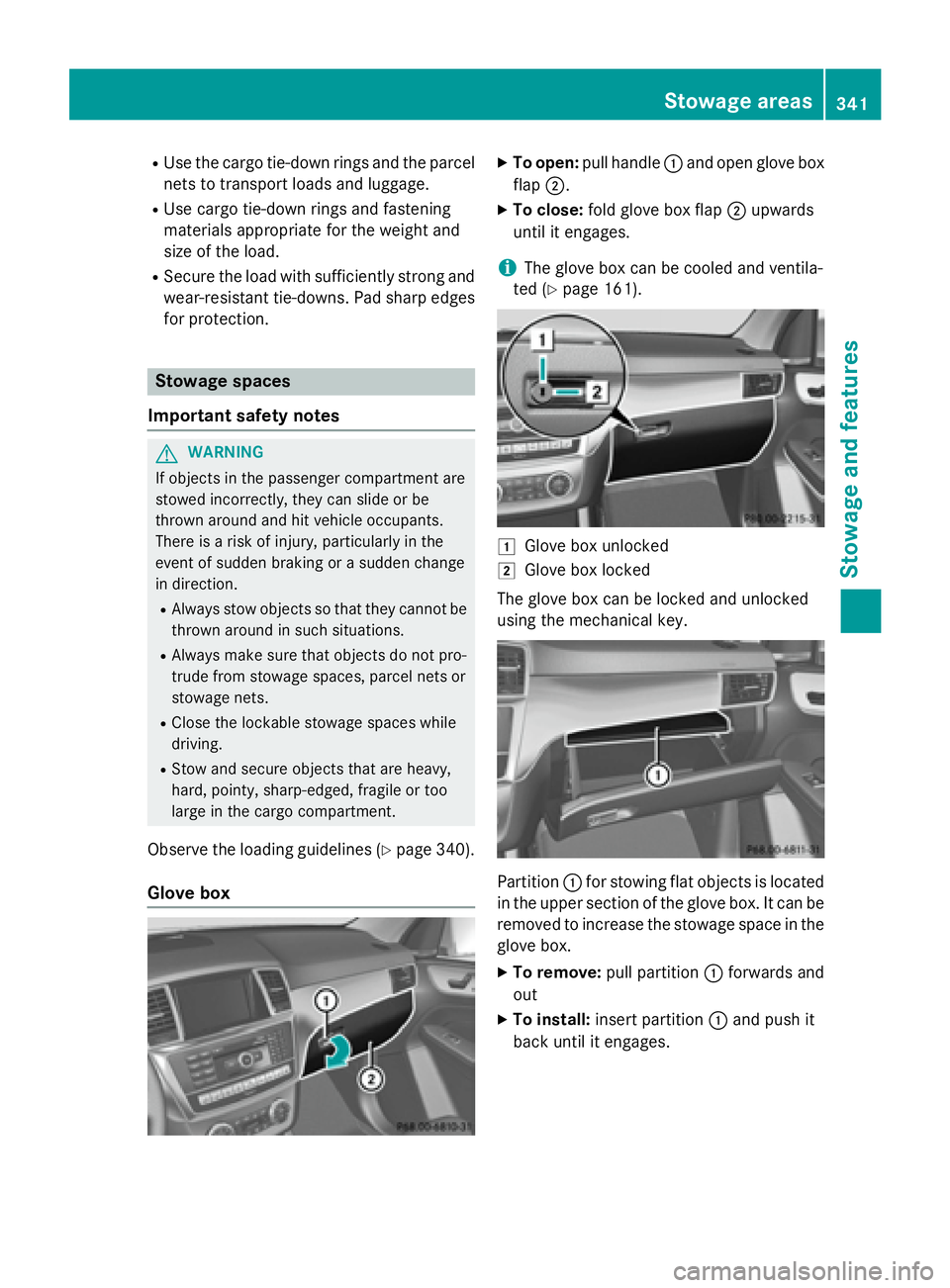
R
Use the cargo tie-down rings and the parcel
nets to transport loads and luggage. R
Use cargo tie-down rings and fastening
materials appropriate for the weight and
size of the load. R
Secure the load with sufficiently strong and
wear-resistant tie-downs. Pad sharp edges
for protection.
Stowage spaces
Important safety notes
G WARNING
If objects in the passenger compartment are
stowed incorrectly, they can slide or be
thrown around and hit vehicle occupants.
There is a risk of injury, particularly in the
event of sudden braking or a sudden change
in direction. R
Always stow objects so that they cannot be
thrown around in such situations. R
Always make sure that objects do not pro-
trude from stowage spaces, parcel nets or
stowage nets. R
Close the lockable stowage spaces while
driving. R
Stow and secure objects that are heavy,
hard, pointy, sharp-edged, fragile or too
large in the cargo compartment.
Observe the loading guidelines ( Y
page 340).
Glove box X
To open: pull handle �C and open glove box
flap �D . X
To close: fold glove box flap �D upwards
until it engages.
i The glove box can be cooled and ventila-
ted ( Y
page 161).
�G
Glove box unlocked �H
Glove box locked
The glove box can be locked and unlocked
using the mechanical key.
Partition �C for stowing flat objects is located
in the upper section of the glove box. It can be
removed to increase the stowage space in the
glove box. X
To remove: pull partition �C forwards and
out X
To install: insert partition �C and push it
back until it engages. Stowage areas 341
Stowage and features Z
Page 344 of 462
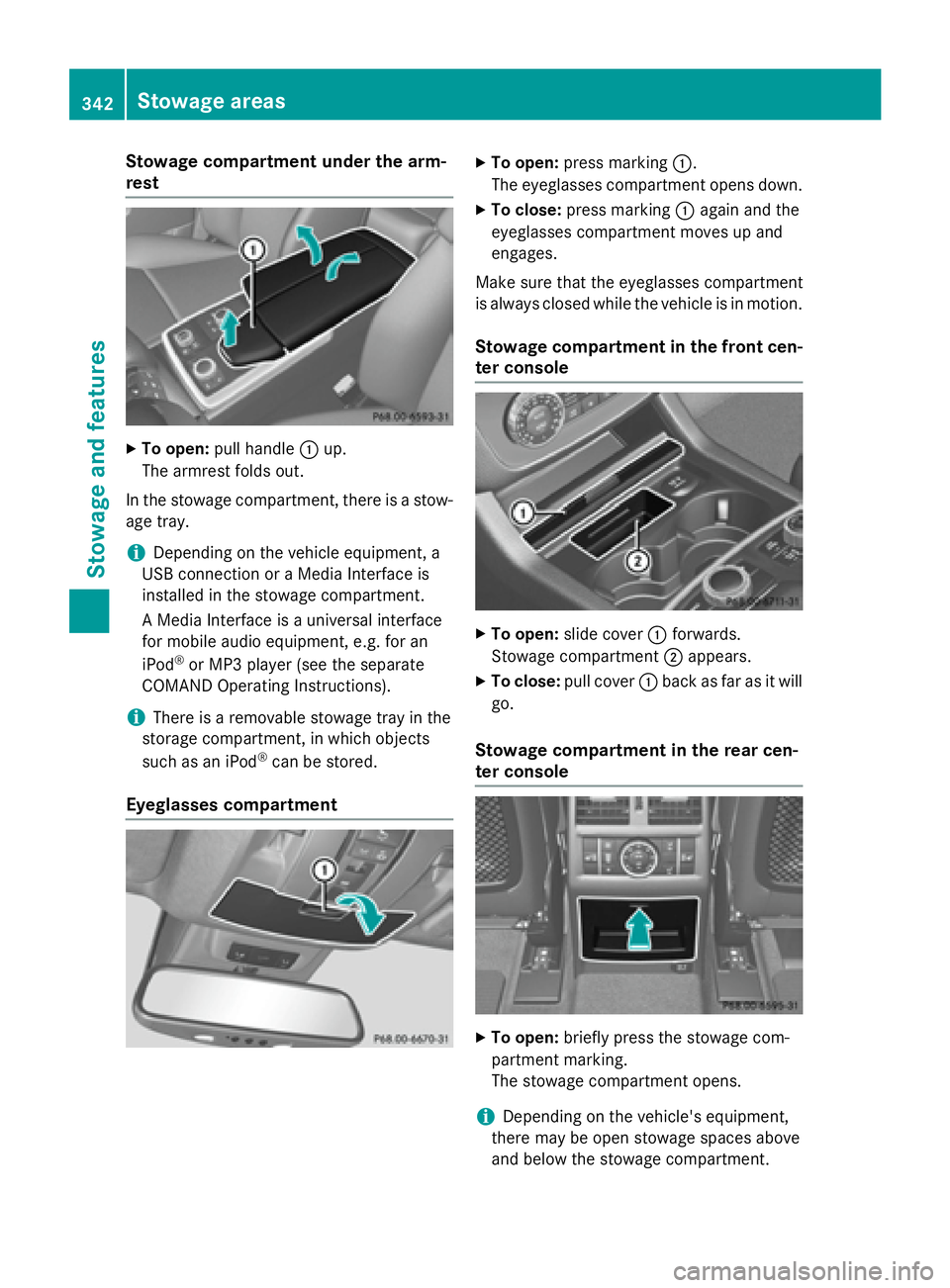
Stowage compartment under the arm-
rest X
To open: pull handle �C up.
The armrest folds out.
In the stowage compartment, there is a stow-
age tray.
i Depending on the vehicle equipment, a
USB connection or a Media Interface is
installed in the stowage compartment.
A Media Interface is a universal interface
for mobile audio equipment, e.g. for an
iPod ®
or MP3 player (see the separate
COMAND Operating Instructions).
i There is a removable stowage tray in the
storage compartment, in which objects
such as an iPod ®
can be stored.
Eyeglasses compartment X
To open: press marking �C .
The eyeglasses compartment opens down. X
To close: press marking �C again and the
eyeglasses compartment moves up and
engages.
Make sure that the eyeglasses compartment
is always closed while the vehicle is in motion.
Stowage compartment in the front cen-
ter console X
To open: slide cover �C forwards.
Stowage compartment �D appears.X
To close: pull cover �C back as far as it will
go.
Stowage compartment in the rear cen-
ter console
X
To open: briefly press the stowage com-
partment marking.
The stowage compartment opens.
i Depending on the vehicle's equipment,
there may be open stowage spaces above
and below the stowage compartment.342
Stowage areas
Stowage and features
Page 345 of 462
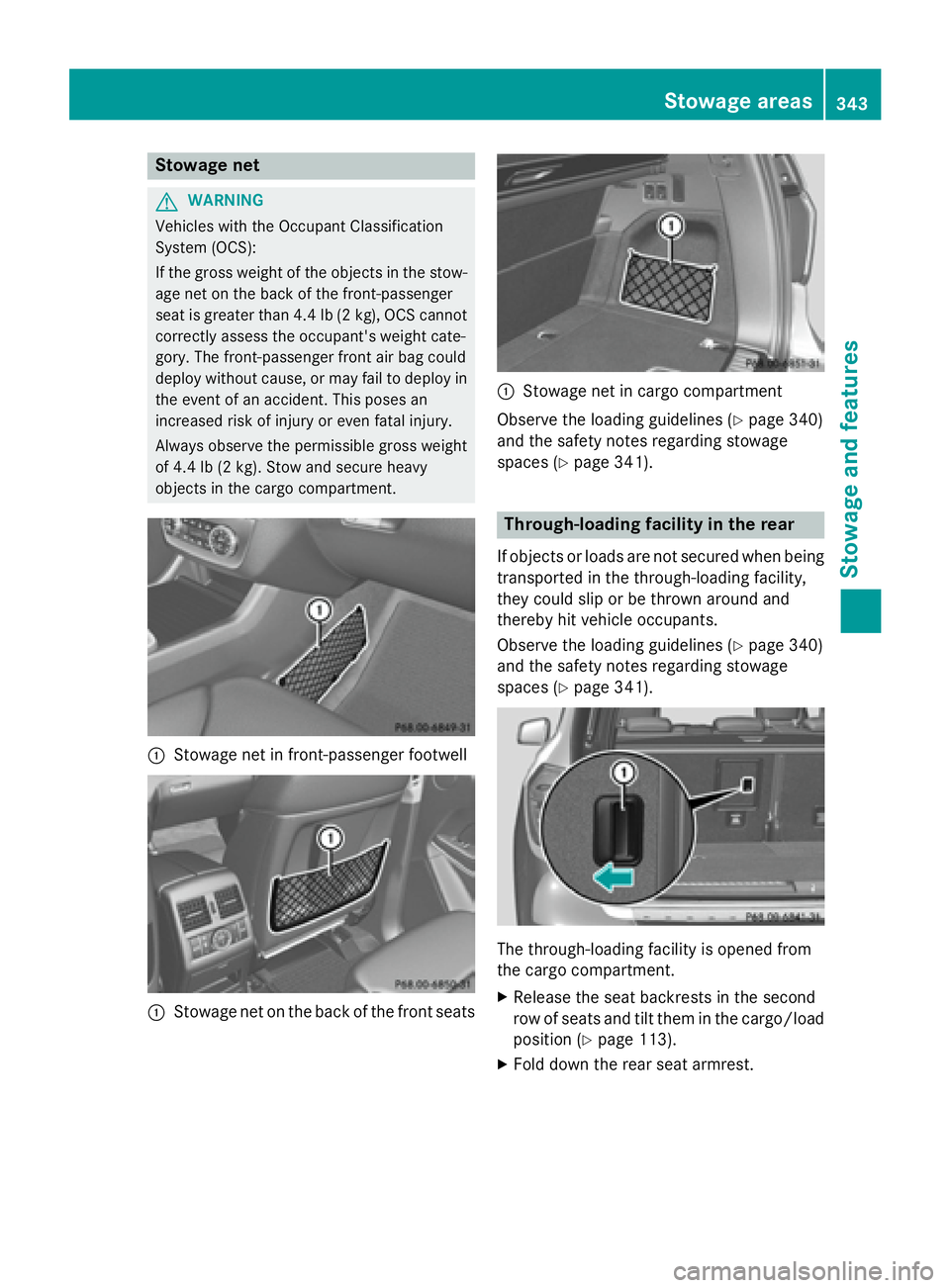
Stowage net
G WARNING
Vehicles with the Occupant Classification
System (OCS):
If the gross weight of the objects in the stow-
age net on the back of the front-passenger
seat is greater than 4.4 lb (2 kg), OCS cannot
correctly assess the occupant's weight cate-
gory. The front-passenger front air bag could
deploy without cause, or may fail to deploy in
the event of an accident. This poses an
increased risk of injury or even fatal injury.
Always observe the permissible gross weight
of 4.4 lb (2 kg). Stow and secure heavy
objects in the cargo compartment.
�C
Stowage net in front-passenger footwell
�C
Stowage net on the back of the front seats �C
Stowage net in cargo compartment
Observe the loading guidelines ( Y
page 340)
and the safety notes regarding stowage
spaces ( Y
page 341).
Through-loading facility in the rear If objects or loads are not secured when being
transported in the through-loading facility,
they could slip or be thrown around and
thereby hit vehicle occupants.
Observe the loading guidelines ( Y
page 340)
and the safety notes regarding stowage
spaces ( Y
page 341).
The through-loading facility is opened from
the cargo compartment. X
Release the seat backrests in the second
row of seats and tilt them in the cargo/load
position ( Y
page 113). X
Fold down the rear seat armrest. Stowage areas 343
Stowage and features Z
Page 346 of 462
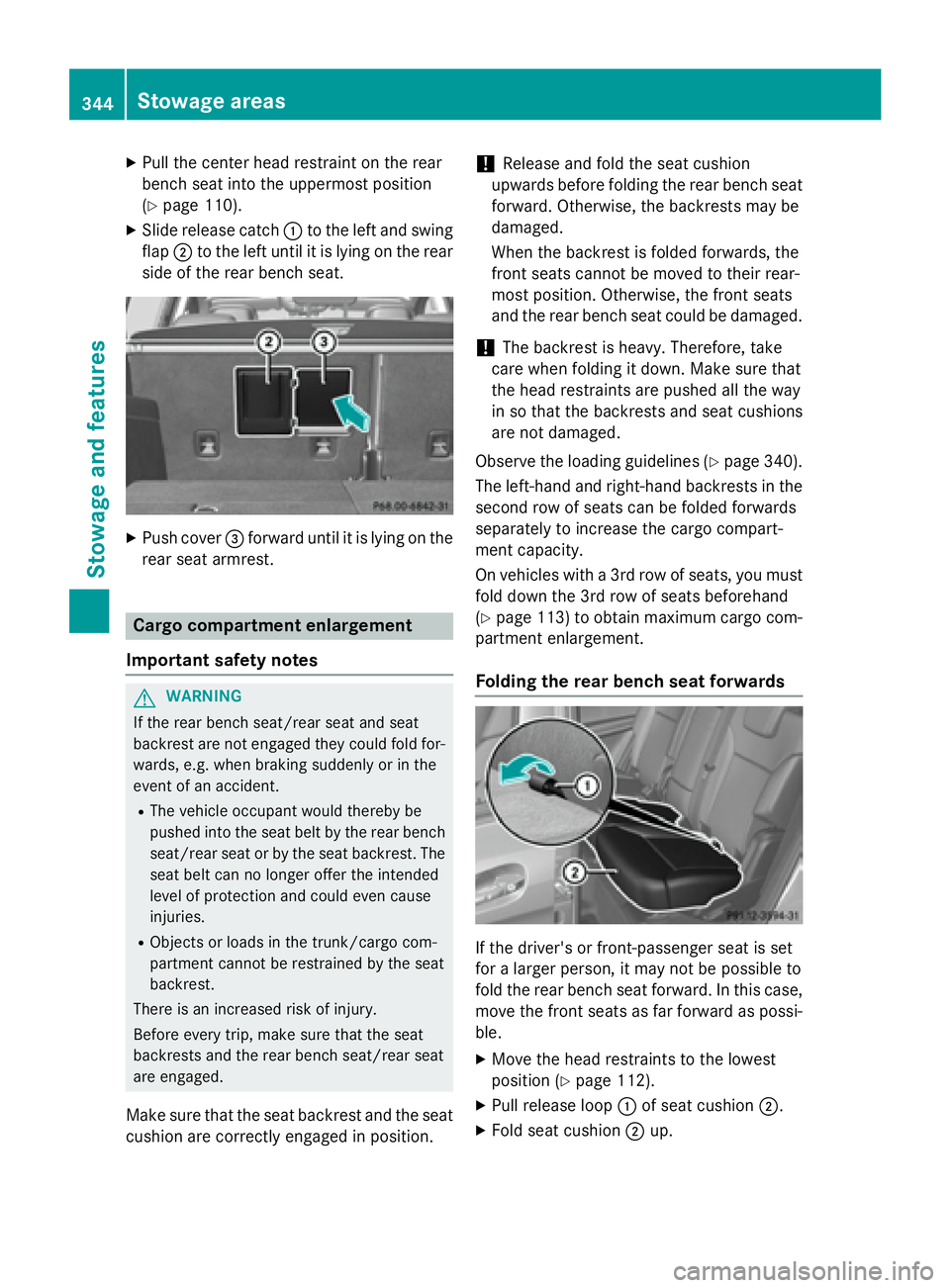
X
Pull the center head restraint on the rear
bench seat into the uppermost position
( Y
page 110). X
Slide release catch �C to the left and swing
flap �D to the left until it is lying on the rear
side of the rear bench seat. X
Push cover �
Page 347 of 462
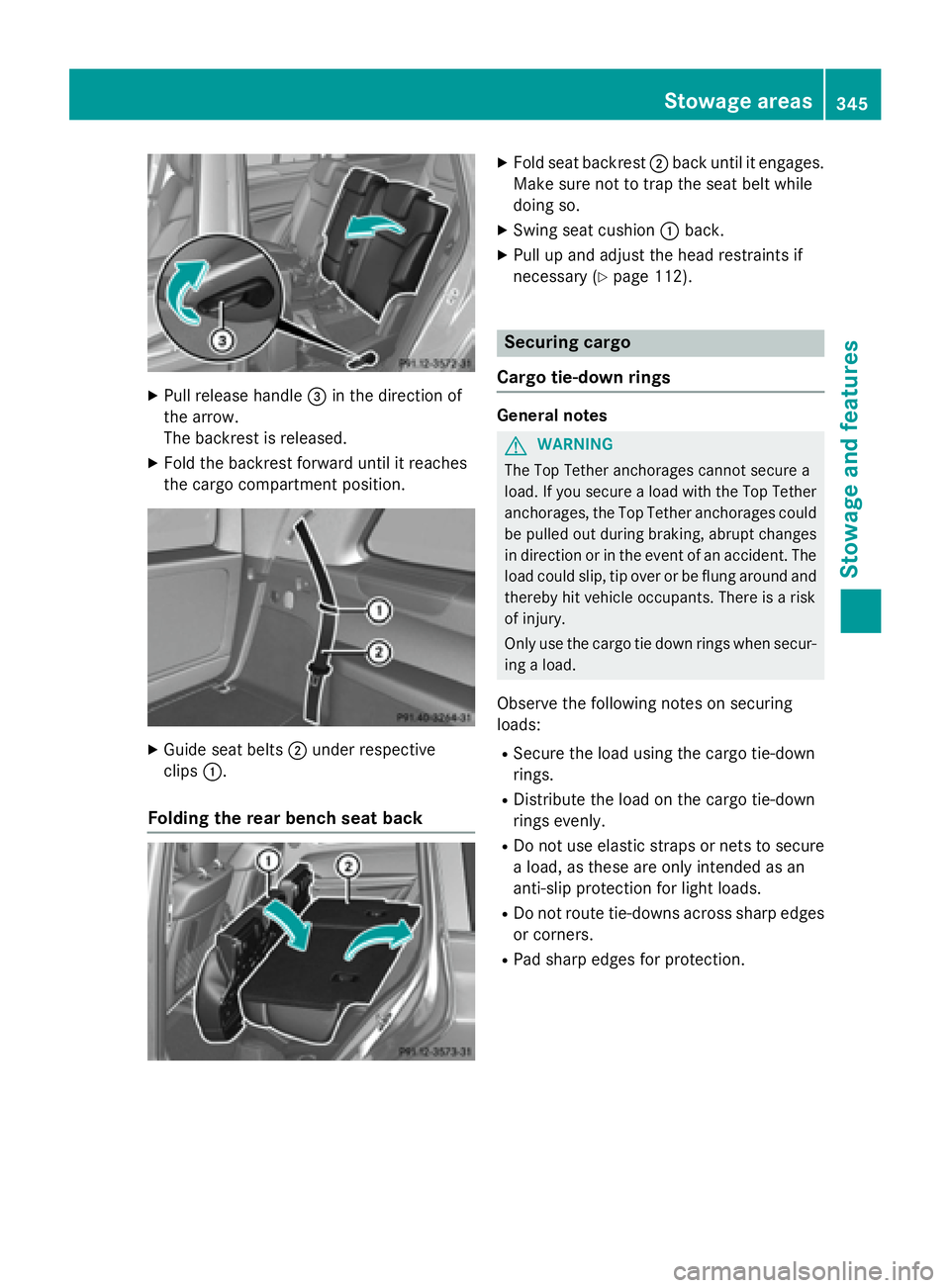
X
Pull release handle �
Page 348 of 462
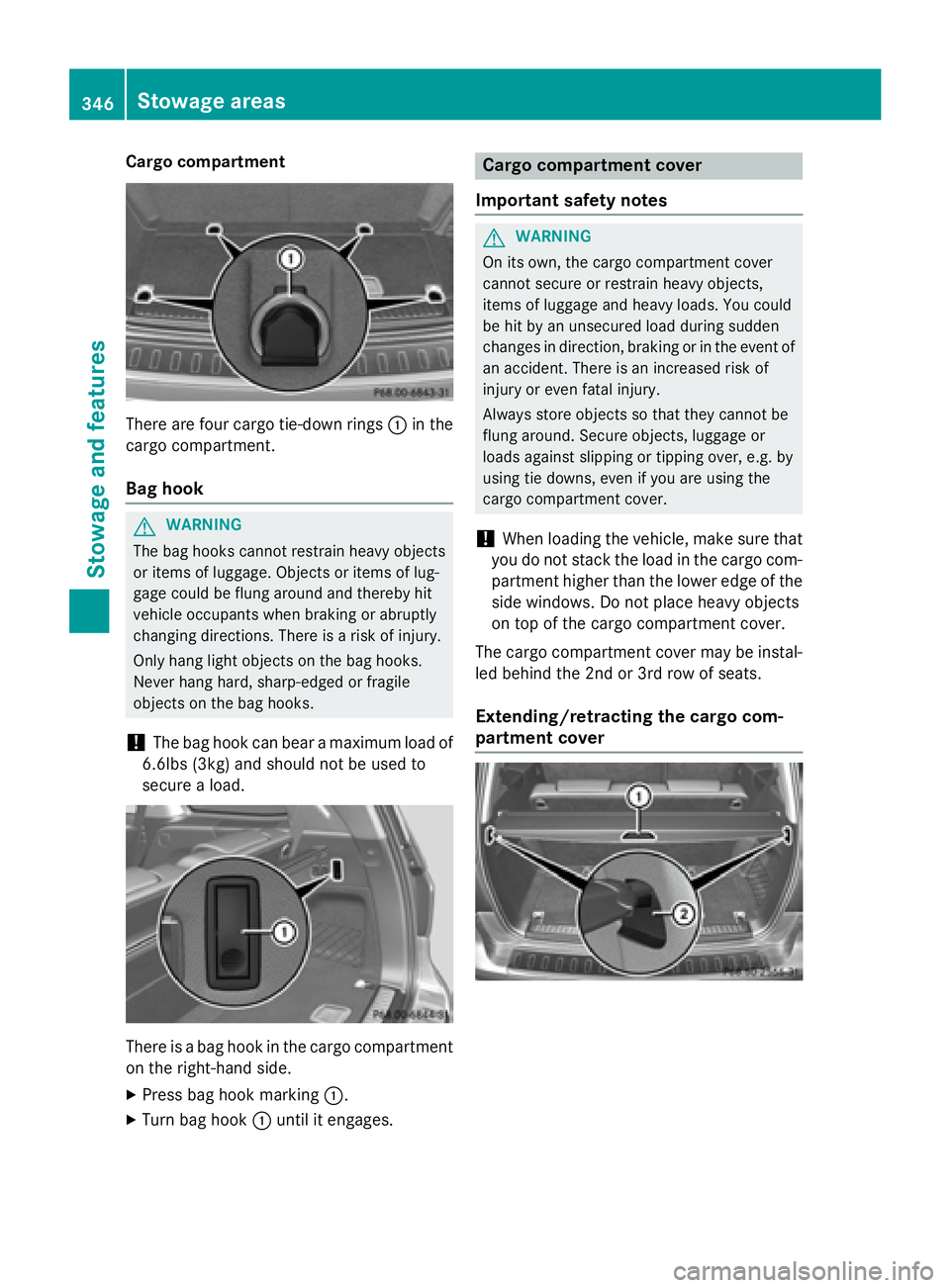
Cargo compartment
There are four cargo tie-down rings �C in the
cargo compartment.
Bag hook
G WARNING
The bag hooks cannot restrain heavy objects
or items of luggage. Objects or items of lug-
gage could be flung around and thereby hit
vehicle occupants when braking or abruptly
changing directions. There is a risk of injury.
Only hang light objects on the bag hooks.
Never hang hard, sharp-edged or fragile
objects on the bag hooks.
! The bag hook can bear a maximum load of
6.6lbs (3kg ) and should not be used to
secure a load.
There is a bag hook in the cargo compartment
on the right-hand side. X
Press bag hook marking �C .X
Turn bag hook �C until it engages. Cargo compartment cover
Important safety notes
G WARNING
On its own, the cargo compartment cover
cannot secure or restrain heavy objects,
items of luggage and heavy loads. You could
be hit by an unsecured load during sudden
changes in direction, braking or in the event of
an accident. There is an increased risk of
injury or even fatal injury.
Alwa ys store objects so that they cannot be
flung aroun d. Secure objects, luggage or
loads against slipping or tipping over, e.g. by
using tie downs, even if you are using the
cargo compartment cover.
! When loading the vehicle, make sure that
you do not stack the load in the cargo com-
partment higher than the lower edge of the
side windows. Do not place heavy objects
on top of the cargo compartment cover.
The cargo compartment cover may be instal-
led behind the 2nd or 3rd row of seats.
Extending/retracting the cargo com-
partment cover346
Stowage areas
Stowage and features
Page 349 of 462
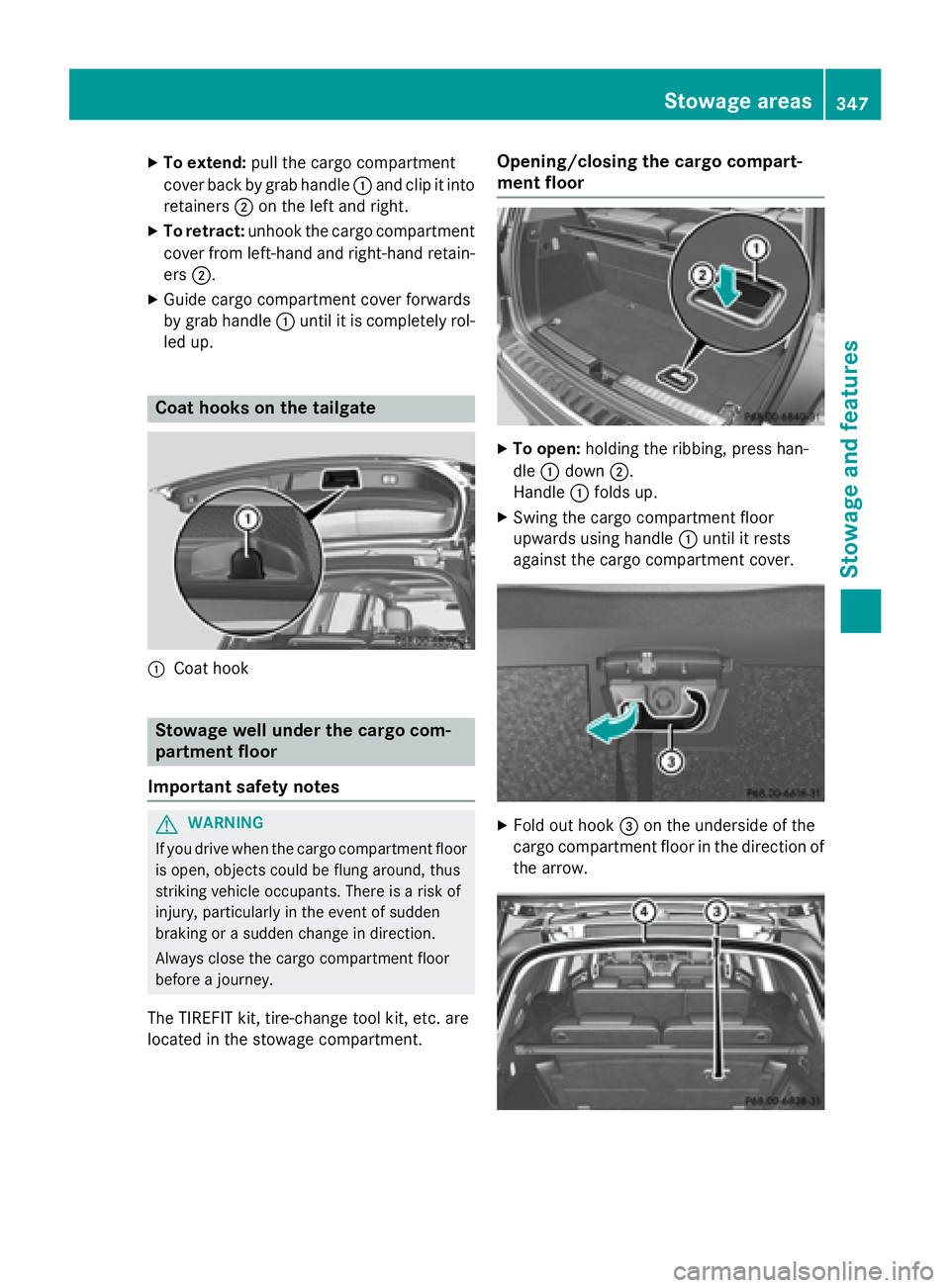
X
To extend: pull the cargo compartment
cover back by grab handle �C and clip it into
retainers �D on the left and right.X
To retract: unhook the cargo compartment
cover from left-hand and right-hand retain-
ers �D .X
Guide cargo compartment cover forwards
by grab handle �C until it is completely rol-
led up.
Coat hooks on the tailgate
�C
Coat hook
Stowage well under the cargo com-
partment floor
Important safety notes
G WARNING
If you drive when the cargo compartment floor
is open, objects could be flung around, thus
striking vehicle occupants. There is a risk of
injury, particularly in the event of sudden
braking or a sudden change in direction.
Always close the cargo compartment floor
before a journey.
The TIREFIT kit, tire-change tool kit, etc. are
located in the stowage compartment. Opening/closing the cargo compart-
ment floor X
To open: holding the ribbing, press han-
dle �C down �D .
Handle �C folds up. X
Swing the cargo compartment floor
upwards using handle �C until it rests
against the cargo compartment cover.
X
Fold out hook �
Page 350 of 462
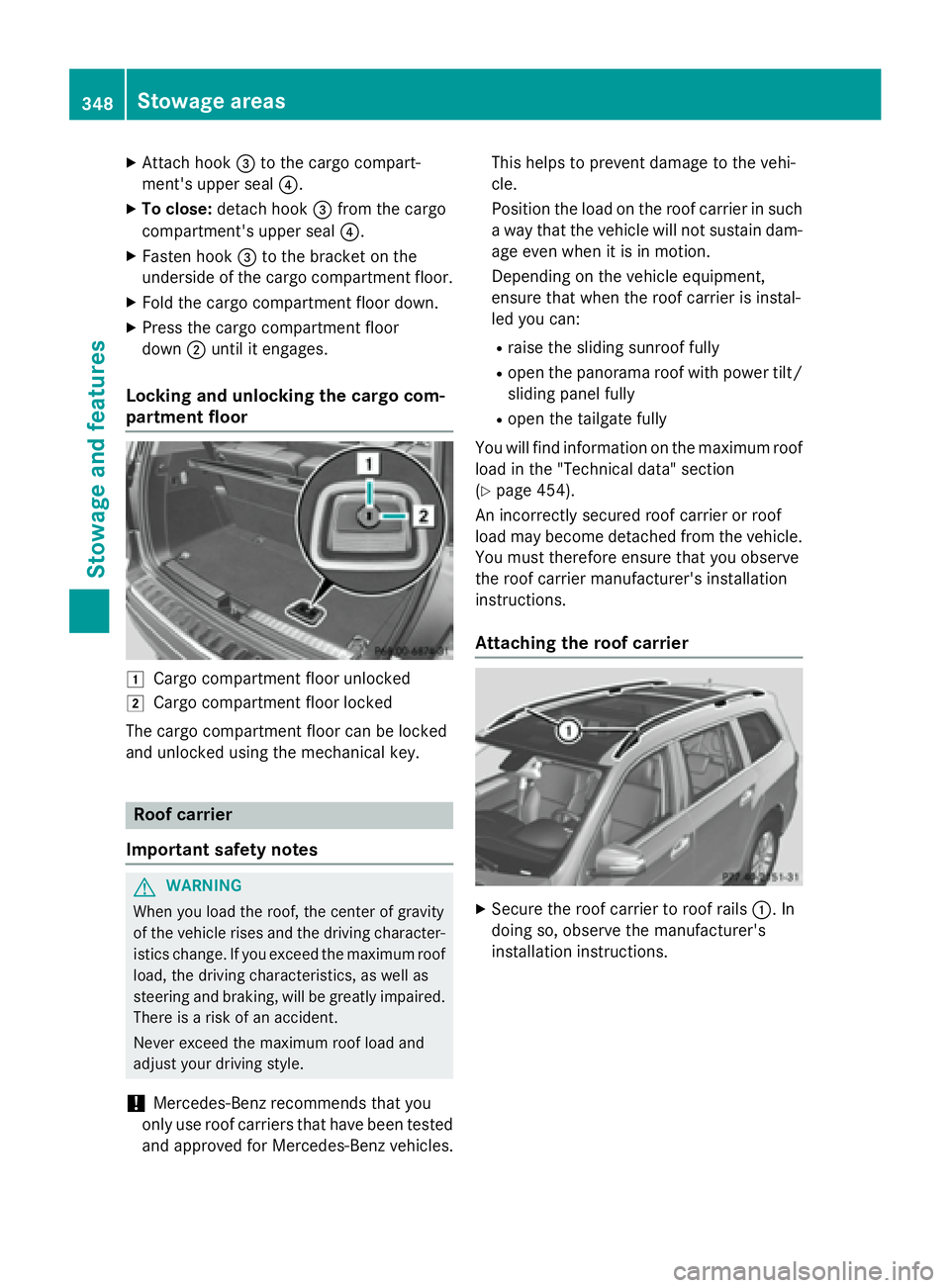
X
Attach hook �